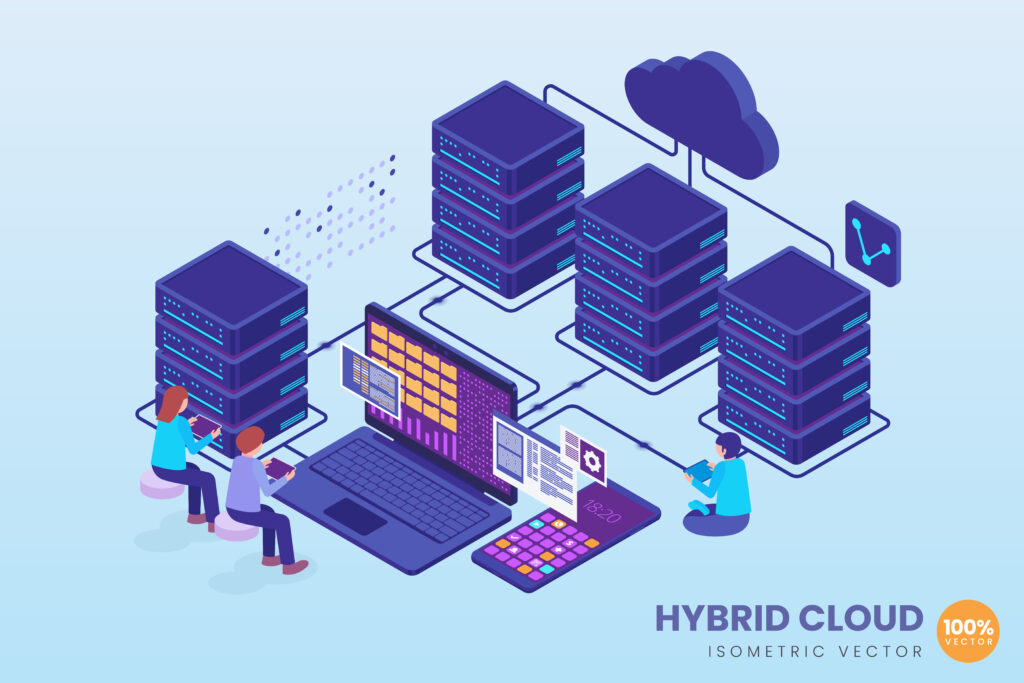Hybrid cloud providers combine public and private cloud solutions to help businesses efficiently manage their resources. By leveraging both environments, these providers offer flexibility, scalability, and security to meet diverse computing needs.
As global enterprises increasingly adopt hybrid cloud strategies, the market for hybrid cloud providers is rapidly expanding. We will explore some of the top providers in the industry, their key features, and the benefits they offer to businesses. Whether you are a small startup or a large corporation, choosing the right hybrid cloud provider is crucial to ensure seamless integration, optimal performance, and cost-effectiveness.

Now, let’s dive into the details of the leading hybrid cloud providers and find the perfect fit for your organization.
Key Hybrid Cloud Providers
Hybrid cloud solutions offer organizations the flexibility and scalability they need to efficiently manage their data and applications. Let’s explore the key players in this space:
Amazon Web Services (aws)
Amazon Web Services (AWS) is a leading provider of hybrid cloud services, offering a wide range of flexible and scalable solutions for businesses.

Microsoft Azure
Microsoft Azure is another major player in the hybrid cloud market, providing innovative and secure services for organizations of all sizes.

Google Cloud Platform
Google Cloud Platform is known for its cutting-edge technologies and reliable infrastructure, making it a top choice for businesses seeking hybrid cloud solutions.

Benefits Of Hybrid Cloud
Discover the advantages of partnering with top providers for Hybrid Cloud solutions. Access flexibility, scalability, and security while optimizing your IT infrastructure. Benefit from seamless integration and enhanced performance with a tailored Hybrid Cloud approach.
Scalability
In today’s fast-paced digital landscape, businesses must be able to scale their IT infrastructure to meet evolving demands. Hybrid cloud providers offer a powerful solution for achieving scalability.
With hybrid cloud technology, businesses can seamlessly scale their resources up or down as needed, without the hassle of investing in additional physical hardware or implementing complicated software setups.
Whether it’s a sudden surge in traffic or the need to accommodate new applications, hybrid cloud providers allow businesses to scale their resources elastically, ensuring optimal performance and user experience.
Cost Efficiency
Cost efficiency is a key factor for businesses of all sizes, and hybrid cloud providers offer a cost-effective solution for managing IT infrastructure.
By leveraging the hybrid cloud model, businesses can optimize their resource allocation, utilizing the most cost-efficient options for their needs. On-premises infrastructure can handle sensitive data and critical applications, while non-sensitive tasks and fluctuating workloads can be offloaded to the public cloud.

This strategy not only eliminates the need to purchase and maintain excess hardware but also minimizes operational costs associated with power consumption, cooling, and maintenance.
Additionally, with the pay-as-you-go model offered by most cloud providers, businesses only pay for the resources they actually use, further reducing unnecessary expenses.
Flexibility
The flexibility provided by hybrid cloud infrastructure is invaluable for businesses navigating the ever-changing demands of the digital landscape.
With a hybrid cloud setup, businesses have the freedom to choose where to host their workloads based on specific requirements. Sensitive data can remain securely on-premises, while less sensitive workloads can be offloaded to the public cloud.
This flexibility not only allows businesses to optimize their resource allocation but also enables them to leverage the unique features and capabilities of different cloud environments. They can benefit from the scalability and cost-efficiency of the public cloud, while maintaining control over critical data and applications hosted on their private infrastructure.
Moreover, the flexibility of hybrid cloud providers extends to compatibility with various operating systems and applications. This means businesses can choose the best fit for their specific needs, without being limited by a single cloud provider’s offerings.
Challenges In Hybrid Cloud Adoption
Adopting a hybrid cloud model offers significant benefits, but it also presents various challenges that organizations need to address. These challenges can range from data security concerns to integration complexities, impacting the seamless implementation and operation of a hybrid cloud environment.
Data Security Concerns
Data security is a paramount concern for organizations considering hybrid cloud adoption. The distribution of sensitive data across both public and private cloud environments introduces the challenge of ensuring comprehensive security measures across these platforms. This includes addressing issues such as data encryption, access control, and compliance with regulatory requirements.

Integration Complexities
The integration of legacy systems, on-premises infrastructure, and multiple cloud providers can pose significant challenges. Organizations need to ensure seamless communication and compatibility between diverse technological environments, including applications, databases, and networking components. This necessitates a robust integration strategy to facilitate smooth data sharing and workflows across the hybrid cloud landscape.

Strategies For Maximizing Efficiency
Strategies for Maximizing Efficiency in hybrid cloud environments play a vital role in streamlining operations and optimizing resource usage. By implementing the right approaches, businesses can achieve enhanced performance, cost savings, and improved scalability. Here are essential considerations to bear in mind.
Optimized Workload Placement
Optimized workload placement is a crucial aspect of maximizing efficiency in a hybrid cloud setup. By strategically distributing workloads between on-premises infrastructure and public/private cloud environments, businesses can capitalize on the unique benefits offered by each platform. Utilizing the strengths of different cloud models, such as scalability of public cloud and security of a private cloud, can help achieve an optimal balance.

Automation Tools
Automation tools play a pivotal role in enhancing efficiency within a hybrid cloud infrastructure. Leveraging automation for provisioning, configuration management, and orchestration of tasks can streamline operations, reduce manual errors, and accelerate deployment cycles. Additionally, implementing auto-scaling mechanisms allows infrastructure to dynamically adjust to changing workloads, ensuring optimal resource utilization.
Case Studies
Explore real-world examples of companies leveraging hybrid cloud providers in these concise case studies. See how businesses successfully implemented and managed their hybrid cloud solutions, highlighting the benefits and challenges they experienced along the way. Get insights into how hybrid cloud providers can offer flexible and scalable solutions for various industries.
When it comes to adopting a hybrid cloud solution for your business, it’s important to have real-world examples of how such providers can enhance operations and deliver cost savings. In this section, we will explore two case studies from Company A and Company B, showcasing the benefits they have achieved through their hybrid cloud implementations.
Company A: Enhancing Operations With Hybrid Cloud
Company A, a leading e-commerce platform, experienced significant growth in their customer base and online transactions. However, their on-premises infrastructure struggled to keep up with the increasing demands, resulting in frequent downtime and decreased performance. Seeking a scalable solution, they turned to a hybrid cloud provider to optimize their operations.

By leveraging the hybrid cloud architecture, Company A was able to distribute their workload efficiently between their on-premises servers and the cloud environment. This ensured high availability and improved speed, allowing them to handle the surge in customer traffic seamlessly. Furthermore, the flexibility of the hybrid cloud solution enabled them to quickly adjust their resources based on fluctuating demand, eliminating the need for excessive investments in physical infrastructure.
Moreover, the hybrid cloud provider offered advanced security features, protecting Company A’s sensitive customer data from potential threats. With built-in encryption and regular security updates, they could focus on their core business without compromising data integrity.
Company B: Cost Savings Through Efficient Hybrid Cloud Adoption
Company B, a global manufacturing firm, faced a common challenge: the high cost of maintaining and upgrading their on-premises IT infrastructure. They recognized the potential of hybrid cloud adoption to reduce costs and improve operational efficiency.
By migrating their non-critical workloads to the cloud, Company B significantly lowered their capital expenditure. They could leverage the pay-as-you-go pricing model for non-essential applications and storage, allowing them to allocate resources more effectively. The hybrid cloud provider offered them the flexibility to scale up or down as needed, optimizing resource allocation and avoiding unnecessary expenses.
| Benefits of Hybrid Cloud Adoption for Company B: |
|---|
| 1. Reduced infrastructure maintenance costs |
| 2. Scalability for fluctuating demand |
| 3. Optimized resource allocation |
| 4. Pay-as-you-go pricing model |
Additionally, Company B experienced improved disaster recovery capabilities. With their critical data stored in the cloud, they minimized the risk of data loss and downtime. The hybrid cloud solution provided automatic backups and replication, ensuring business continuity even in the face of unexpected disruptions.

In conclusion, these case studies demonstrate the tangible benefits that Company A and Company B have achieved through their hybrid cloud adoption. Whether it’s enhancing operations, improving scalability, or reducing costs, the flexibility and efficiency of hybrid cloud providers offer valuable solutions for businesses of all sizes.
Future Trends In Hybrid Cloud
Future Trends in Hybrid Cloud:
Edge Computing Integration
Edge computing enhances data processing near the source for fast response times.
Hybrid cloud providers are introducing edge computing integration for enhanced performance.
Ai-driven Automation
AI-driven automation boosts efficiency and eliminates repetitive tasks.
Hybrid cloud providers are leveraging AI technology for seamless operations.

Frequently Asked Questions Of Hybrid Cloud Providers
What Are Hybrid Cloud Providers?
Hybrid cloud providers offer a mix of private and public cloud services. They enable businesses to seamlessly integrate and manage data across both platforms, optimizing flexibility and security.
How Do Hybrid Cloud Providers Ensure Data Security?
Hybrid cloud providers implement robust encryption, access controls, and comprehensive security protocols. They also offer regular security updates and monitoring, ensuring data remains protected against potential threats.
What Advantages Do Hybrid Cloud Providers Offer?
Hybrid cloud providers deliver scalability, cost-efficiency, and flexibility. They empower businesses to leverage the benefits of both public and private cloud environments, allowing for optimal resource utilization and innovation.
Can Businesses Customize Their Hybrid Cloud Solutions?
Yes, businesses can tailor their hybrid cloud solutions to meet specific needs. Providers offer customizable options for storage, networking, and computing, enabling businesses to design a solution that aligns with their unique requirements.
Choosing the right hybrid cloud provider can greatly benefit businesses in terms of flexibility, scalability, and cost-efficiency. With a range of providers available, it is crucial to thoroughly evaluate each option and consider factors such as security, performance, and compatibility.

By making an informed decision, businesses can leverage hybrid cloud technology to optimize their operations and drive growth. Stay ahead of the competition and harness the power of hybrid cloud today.
